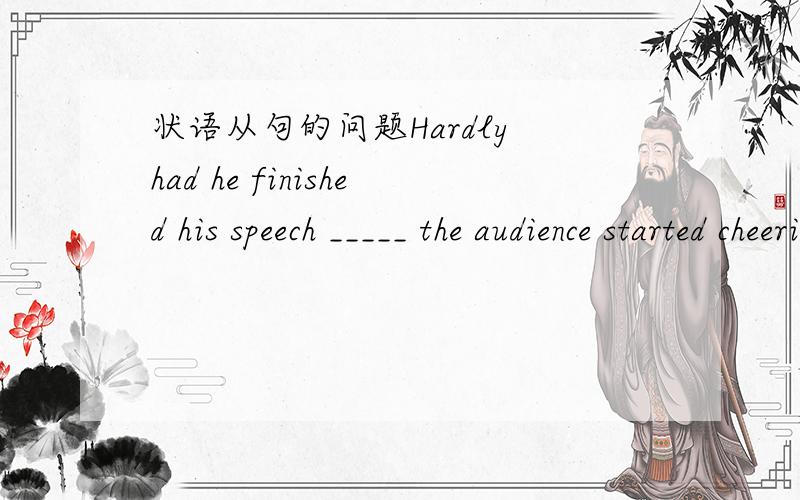状语从句的问题Hardly had he finished his speech _____ the audience started cheering.这里为什么不能填AND而要填when?He declined the invitation partly because he was busy and ______.这里为什么填partly because he lacked money?而
来源:学生作业帮助网 编辑:作业帮 时间:2024/11/15 12:42:55

状语从句的问题Hardly had he finished his speech _____ the audience started cheering.这里为什么不能填AND而要填when?He declined the invitation partly because he was busy and ______.这里为什么填partly because he lacked money?而
状语从句的问题
Hardly had he finished his speech _____ the audience started cheering.
这里为什么不能填AND而要填when?
He declined the invitation partly because he was busy and ______.
这里为什么填partly because he lacked money?而不填写partly his lacked of money?
I was just about to leave the house ______ the telephone rang.
a.When
b.As
c.As soon as
d.While
好像除了b都可以,这里应该怎么分析?
_______ hard he tried ,he could not lift it.
A.Whichever
B.No matter
C.However
D.Although
这里应该填什么?
I decided to go to the library as soon as I _______.
A.Finished what I did
B.Finished what I was doing.
为什么不能用A呢?
His father began to work ______ he was seven years old.
为什么这里不用since而要用as early as?
I am go to Manchester next month,I will visit martin ______ I went there.
a.Once
b.When
这里为什么不能用WHEN?
Take _____ much you want _____ you want to.
A.However;whenever
B.However;whichever
I was persuaded to do the job,_____ I did not want to.
A.Last
B.In order that
C.Even though
D.In case
_____ he will not accept the offer,I have to find somebody else.
A.Until
B.Though
C.As soon as
D.Seeing that.
为什么不能用C?
状语从句的问题Hardly had he finished his speech _____ the audience started cheering.这里为什么不能填AND而要填when?He declined the invitation partly because he was busy and ______.这里为什么填partly because he lacked money?而
Hardly had he finished his speech _____ the audience started cheering.
这里为什么不能填AND而要填when?
答:因为AND连接的是两个并列结构的句子,从句子结构看,前半部分说的是:他几乎还没完成他的发言,后半句:观众开始鼓掌,所以用when表示一个时间状语,而且如果是AND连接,前面半句也不可能用倒装句式.
He declined the invitation partly because he was busy and ______.
这里为什么填partly because he lacked money?而不填写partly his lacked of money?
答:在并列句中,动词是可以当再次出现的时候省略的,because是连词不行
I was just about to leave the house ______ the telephone rang.
a.When
b.As
c.As soon as
d.While
好像除了b都可以,这里应该怎么分析?
我认为a最合适,表示我刚好要走突然来电话了,just about to do something when
_______ hard he tried ,he could not lift it.
A.Whichever
B.No matter
C.However
D.Although
这里应该填什么?
答:应该选c,无论他多么用力尝试,都举不起来.因为后面接的的hard,形容词,However+形容词.
I decided to go to the library as soon as I _______.
A.Finished what I did
B.Finished what I was doing.
为什么不能用A呢?
只能说B更合适.因为说这句话的时候应该是说在过去那个时刻正在做着一件事,所以在那个时刻说我一做完手头的事就去图书馆,强调的是说话当时正在完成其他事.
His father began to work ______ he was seven years old.
为什么这里不用since而要用as early as?
答:since这个词,如果前半句是否定的时候用的多,如果前半句是肯定的,那么前半句的动词应该是一个表示持续意思的动词,begin to work显然是一个点动词,所以是不能表示持续意思的,因此搭配since不合适,因为since表示自从某个时刻开始一直,显然begin这个开始的动作是不能持续的,用since是中文上的翻译讲的通,但是不合乎英语的用法.
I am go to Manchester next month,I will visit martin ______ I went there.
a.Once
b.When
这里为什么不能用WHEN?
答:我觉得when可以的,但是ONCE强调的是我一到那里马上就去见martin
Take _____ much you want _____ you want to.
A.However;whenever
B.However;whichever
答:只能选a,很明显,后面是个时间状语,只能用whenever,前面表示程度的,用however
I was persuaded to do the job,_____ I did not want to.
A.Last
B.In order that
C.Even though
D.In case
答:选c,表示转折,从句子来看,我是被说服去做这件事情的,所以显然他是不愿意做的,这里用even though,是尽管的意思,表示让步.
_____ he will not accept the offer,I have to find somebody else.
A.Until
B.Though
C.As soon as
D.Seeing that.
为什么不能用C?
答:我认为选D,句意是:既然他不能接受offer,我只得找其他人.句子前后没有转折,所以b错,until表示到某时位置,本句没这个意思,as soon as 表示一.就.,显然也是不合适的.
1.这是hardly。。。when。。。(“一。。。就。。。”)的固定搭配。
2.lack既可做动词(如本题),又可做名称,都是“缺少”的意思。because后要接一个句子,故不能用his lacked of。
3.只有a. When是正确的。
be about to do sth when 的意思是“正要做某事(可)这时候。。。”
4.C. However
全部展开
1.这是hardly。。。when。。。(“一。。。就。。。”)的固定搭配。
2.lack既可做动词(如本题),又可做名称,都是“缺少”的意思。because后要接一个句子,故不能用his lacked of。
3.只有a. When是正确的。
be about to do sth when 的意思是“正要做某事(可)这时候。。。”
4.C. However
however =no matter how,“无论怎样(都)。。。”
5.what I did 表示过去所做或所完成的事情,动作已发生,已完成。既已完成,又怎么还会又有finish呢?
6.since 的意思虽有“自从”的意思,但它总是与完成时态一起用的。
7.句子表达是将来的事情,后面用的是过去时,若用when,时态不对。
8.B. However;whichever
9.C. Even though即使
10.as soon as 是一。。。就。。。的意思,与句子意思不符。
收起